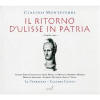Texte paru dans: / Appeared in:
*

International Record Review - (06/2012)
Pour
s'abonner / Subscription information
Glossa
GCD920920

8424562209206 (ID231)
Consultez toutes les évaluations recensées pour ce cd
~~~~ Reach all the evaluations located for this CD
‘Cinderella, Cinderella!’ Today, set alongside Orfeo (1607), which spectacularly pioneered the genre, and Poppea (1642), the first operatic masterpiece of profound humanity, Monteverdi’s only other surviving opera, The Return of Ulysses (1640), burns less brightly. Well, that’s the opinion of the booklet note writer here, Stefano Russomanno. Apparently, Ulysses — ‘without doubt, the Cinderella of Monteverdi’s operas’ - is less frequently performed today than the other two works because it has fewer musical and dramatic high points and less immediate appeal. A curious way to whet our appetite … and of course woefully simplistic. All three operas are very different beasts, each with its own idiosyncrasies, challenges, high and low points. Yet, to my ears, Ulysses has always been every bit as impressive in the theatre as its cousins. So, I say: ‘Cinderella, Cinderella ... you shall go the Balll’. Happily, Claudio Cavina and La Venexiana believe passionately in the music to.
TheReturn ofUlysses has survived by the skin of its teeth in a single manuscript which doesn’t even mention the composer and leaves a fair amount of the colouring-in to be done by the performers themselves. At the root of the success of this performance is Cavina’s flexible, ever-changing continuo team, which helps underscore and inflect the vocal line with its range of plucking and sustaining sonorities. All the usual suspects are here, including three lutes, harpsichord, viola da gamba and (probably a bit of an indulgence) a small harp.
As with so many Venetian operas of the mid-seventeenth century, the score provided the meat but the veg were seasonal, changing according to the resources available and demands of each new production. Cavina has a strong dramatic sense about where this rather lean score needs filling out with instrumental movements, string accompaniments and the like. In the past, some conductors have gone too far, and certainly Cavina goes further than many today in his use of a harmonic vapour of strings to enhance the vocal lie at climactic moments. I’ve been following the recording with a facsimile of the surviving manuscript and most of what he does rings true and works very effectively indeed, thanks to the light touch of the seasoned performers of La Venexiana.
In the surviving manuscript, Act 1 scene 5 opens with the indication that an instrumental Sinfonia should be played to introduce the god Neptune, sung here with magnificent gravity by bass Salvo Vitale. There’s no music though, and this is one of many places where Cavina returns to Orfeo for inspiration. It’s a moot point whether a composer as acutely fashion-conscious as Monteverdi would be harking back to a style which was now well over three decades old; but Cavina argues that at least Orfeo provides us with pure Monteverdi, whereas both Poppea and Ulysses itself clearly bear the marks of other hands.
The first time we hear from Ulysses (Act 1 scene 7) Cavina again prefaces the scene with an Orfeo-inspired Sinfonia, and halfway through his monologue (‘O sonno, O mortal sonno’ — ‘Oh sleep, oh mortal sleep’) he accompanies the voice with slow-moving string harmonies, in just the way that Monteverdi did in the very similar passage from Orfeo where Orfeo greets the awesome Caronte with the words ‘ Sol tu, nobile Dio ‘ — ‘Only you, noble God’ . It’s very effective, and the use of sustained string harmonies to add weight to dramatically and musically important vocal writing continues throughout the score but not so frequently as to lose their special effect. It’s always done with single strings and so subtly that the effect is really like a blossoming of the continuo accompaniment (particularly the chord-playing, gamba-like lirone).
Cavina has assembled a strong and experienced cast and, as is the prevailing taste with many Italian Baroque ensembles, he’s less worried about vocal vibrato than many of his European colleagues. But there are times when I do find it a little wearing. The grieving Penelope — Ulysses’s wife — is sung here by Josè Maria Lo Monaco, from whom we get plenty of natural contralto pathos, but in the higher reaches of the largely unadorned recitative (which is her lot) there’s often a slightly careless vibrato which can rob the recitative of its incisiveness, though Monaco is perfectly able to focus her tone when the vocal line more obviously calls for it (as in passages of harmonic tension, or repeated phrases). Her glorious, heart-rending monologue ‘Di misera regina’ which opens Act 1 and emotionally dominates the opera is still very powerful though. Tenor Anicio Zorzi Giustiniani in the title role comes from the same stable, with more vibrato than I’d like but a good range of tone colours and a youthful sound which suggests an initially less formed and mature character, throwing the emphasis onto his physical and emotional journey through the opera.
Of the smaller roles, the comic, ever hungry Iro, sung here by tenor Luca Dordolo, avoids excessive slapstick especially with ail the exaggerated stuttering, which, when over cooked, tends to wear rather thin after repeated exposure. The opera sports a large cast so, quite authentically, a number of the singers double up, mostly very successfully, especially tenor Makoto Sakurada, who makes a nice contrast between high and low characters: the lightweight Eurimaco and Ulysses’s son, Telemaco. In the Prologue the conductor himself, Claudio Cavina, pops up as the central allegorical figure — Human Frailty — which he delivers with a wonderfully honeyed alto and just a dash of vulnerability.
As always with Glossa, the booklet texts are well done, though it’s intriguing to note that although this is a Spanish label the libretto is translated only into’ English ( extremely well, with some nice colloquial touches, by Avril Bardoni). There’s no synopsis, which in an opera of this length and with so many characters is an annoying omission, though you have only to go to your handy copy of The Odyssey (Books 13-23) to get the gist of it. However, I loved the recording. The close balance of the continuo instruments allows us to savour their ever changing colours and the singers too have been intimately caught. Intimacy is absolutely right: Venetian theatres were small and cosy, with the audience much closer to the stage than in opera houses today, and this scale works well for an audio recording which most of us will listen to in a relatively modest space.
So, this is no fairy-tale production with
overblown orchestration and too much tinkering and transposition . . . and
nor are there any ugly sisters in the cast. There may be a touch too much
vibrato for some, but it’s not a sign of over-indulgence. Overall, this is a
measured, well-paced performance in which the drama is propulsive rather
than emotionally lingering or excessively probing. For me, it’s a
performance which feels much more like an ensemble piece than usual. Instead
of the drama simply revolving around the tragic Penelope, or Ulysses’s sly
return, Cavina manages to integrate all characters great and small — the
opera has never sounded more like a simmering pot of Venetian Carnival
vaudeville — which is surely what it is.
Fermer la fenêtre/Close window
Cliquez l'un ou l'autre
bouton pour découvrir bien d'autres critiques de CD
Click either button for many other reviews


